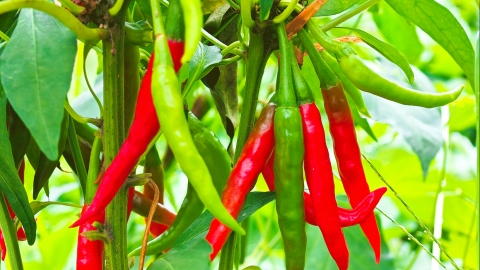What is incompatible with Ophiopogon japonicus (McDoor)?
Generally speaking, Ophiopogon (McDoor) is incompatible with chili peppers, mung beans, Astragalus (Huang Qi), cinnamon twigs, and dried ginger. The specific analysis is as follows:

1. Chili Peppers
Chili peppers are hot in nature and have a dispersing effect, which contradicts the nourishing and moistening properties of Ophiopogon. Consuming both together may counteract the nourishing-yin effects of Ophiopogon, causing symptoms such as dry mouth and throat or constipation, especially unsuitable for individuals with a constitution characterized by yin deficiency and excessive internal heat.
2. Mung Beans
Mung beans are cold in nature, similar to Ophiopogon. Consuming excessive amounts together may damage the yang energy of the spleen and stomach, leading to symptoms such as abdominal distension and loose stools. Additionally, the heat-clearing and detoxifying effects of mung beans may interfere with the nourishing-yin and fluid-producing effects of Ophiopogon, potentially causing conflicting medicinal effects.
3. Astragalus
Astragalus is a single herb known in traditional Chinese medicine for its blood sugar-lowering effects. When combined, the medicinal effects may become too strong, accelerating the rate of blood sugar reduction. This can significantly affect individuals, especially diabetic patients, potentially causing hypoglycemic symptoms such as dizziness, insufficient qi and blood, limb weakness, and pale complexion.
4. Cinnamon Twigs
Cinnamon twigs are warm in nature and have effects of promoting sweating to relieve exterior symptoms and warming the meridians to promote circulation. However, Ophiopogon is primarily used for nourishing lung yin and moistening dryness. Combining the two may result in mutual suppression of their effects due to differing properties, affecting the normal absorption and utilization of the herbs.
5. Dried Ginger
Dried ginger is hot in nature and warms the middle jiao to dispel cold, whereas Ophiopogon is cold in nature and primarily used for nourishing yin and clearing heat. Their properties are completely opposite, and combining them may result in mutual restraint of their medicinal effects, reducing efficacy and potentially irritating the spleen and stomach.
Although the above-mentioned herbs or foods are considered incompatible with Ophiopogon, actual usage should still be based on individual conditions and guided by a physician's recommendations for appropriate combinations.




